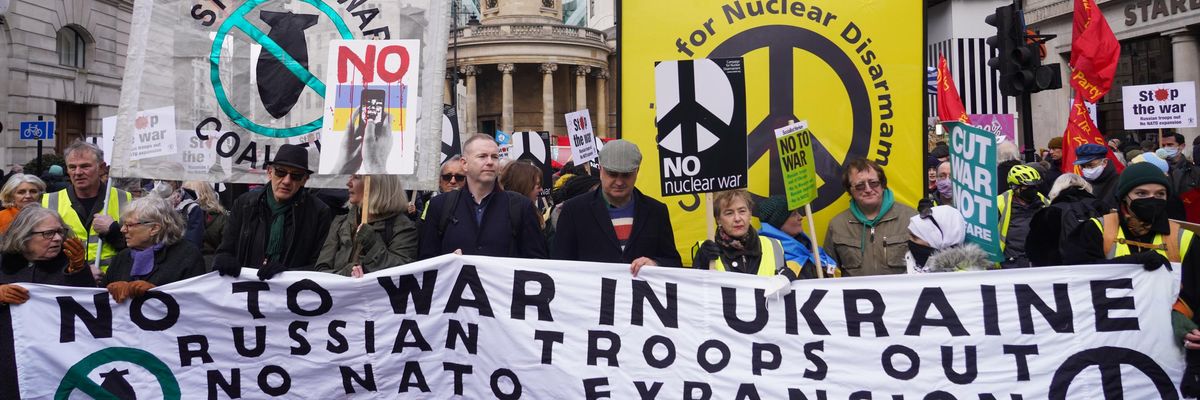

SUBSCRIBE TO OUR FREE NEWSLETTER
Daily news & progressive opinion—funded by the people, not the corporations—delivered straight to your inbox.
5
#000000
#FFFFFF
To donate by check, phone, or other method, see our More Ways to Give page.


Daily news & progressive opinion—funded by the people, not the corporations—delivered straight to your inbox.

Thousands of demonstrators march for peace in Ukraine on February 6, 2022 in central London. (Photo: Kristian Buus/In Pictures via Getty Images)
Amid Moscow's thermonuclear saber-rattling during Russia's invasion of Ukraine, state parties to the Treaty on the Prohibition of Nuclear Weapons on Thursday condemned "any and all nuclear threats" while calling on more countries to sign and ratify the landmark accord.
"This is the strongest condemnation of nuclear threats by a multilateral U.N. conference."
As the first Meeting of State Parties (1MSP) to the TPNW wrapped up in Vienna, the 65 countries that have signed and ratified the treaty issued a declaration and action plan unequivocally condemning threats to wage nuclear war, "whether they be explicit or implicit and irrespective of the circumstances."
The TPNW signatories committed to "further stigmatizing and delegitimizing nuclear weapons and steadily building a robust global peremptory norm against them."
"In the face of the catastrophic risks posed by nuclear weapons and in the interest of the very survival of humanity... we will not rest until the last state has joined the treaty, the last warhead has been dismantled and destroyed and nuclear weapons have been totally eliminated from the Earth," the declaration concludes.
Beatrice Fihn, executive director of the Nobel Peace Prize-winning International Campaign to Abolish Nuclear Weapons (ICAN), said in a statement that "this is the strongest condemnation of nuclear threats by a multilateral U.N. conference, and shows an unprecedented commitment by a global alliance of states, survivors of nuclear detonations, international organizations, and civil society to prevent nuclear war and eliminate nuclear weapons."
Masao Tomonaga, a survivor of the August 9, 1945 U.S. nuclear attack on Nagasaki, Japan that killed more than 75,000 people, said that "this political declaration is a very strong document, despite many difficulties we face."
"With this powerful document we can go forward, and all Hibakusha support this; it is a great document," Tomonaga added, referring to the Japanese word for atomic bomb survivor.
The declaration and action plan come after Russian President Vladimir Putin warned last week that his country could use nuclear weapons if its sovereignty is threatened.
With more than 11,000 nuclear warheads in their combined arsenals, Russia and the United States--the only nation to ever wage nuclear war--are the world's leading atomic powers.
Related Content

Eighty-six nations have signed the TPNW and 65 have ratified the accord. Notably, none of the world's nine nuclear powers--China, France, India, Israel, North Korea, Pakistan, Russia, the United Kingdom, and the United States--have signed the agreement.
Dear Common Dreams reader, The U.S. is on a fast track to authoritarianism like nothing I've ever seen. Meanwhile, corporate news outlets are utterly capitulating to Trump, twisting their coverage to avoid drawing his ire while lining up to stuff cash in his pockets. That's why I believe that Common Dreams is doing the best and most consequential reporting that we've ever done. Our small but mighty team is a progressive reporting powerhouse, covering the news every day that the corporate media never will. Our mission has always been simple: To inform. To inspire. And to ignite change for the common good. Now here's the key piece that I want all our readers to understand: None of this would be possible without your financial support. That's not just some fundraising cliche. It's the absolute and literal truth. We don't accept corporate advertising and never will. We don't have a paywall because we don't think people should be blocked from critical news based on their ability to pay. Everything we do is funded by the donations of readers like you. Will you donate now to help power the nonprofit, independent reporting of Common Dreams? Thank you for being a vital member of our community. Together, we can keep independent journalism alive when it’s needed most. - Craig Brown, Co-founder |
Amid Moscow's thermonuclear saber-rattling during Russia's invasion of Ukraine, state parties to the Treaty on the Prohibition of Nuclear Weapons on Thursday condemned "any and all nuclear threats" while calling on more countries to sign and ratify the landmark accord.
"This is the strongest condemnation of nuclear threats by a multilateral U.N. conference."
As the first Meeting of State Parties (1MSP) to the TPNW wrapped up in Vienna, the 65 countries that have signed and ratified the treaty issued a declaration and action plan unequivocally condemning threats to wage nuclear war, "whether they be explicit or implicit and irrespective of the circumstances."
The TPNW signatories committed to "further stigmatizing and delegitimizing nuclear weapons and steadily building a robust global peremptory norm against them."
"In the face of the catastrophic risks posed by nuclear weapons and in the interest of the very survival of humanity... we will not rest until the last state has joined the treaty, the last warhead has been dismantled and destroyed and nuclear weapons have been totally eliminated from the Earth," the declaration concludes.
Beatrice Fihn, executive director of the Nobel Peace Prize-winning International Campaign to Abolish Nuclear Weapons (ICAN), said in a statement that "this is the strongest condemnation of nuclear threats by a multilateral U.N. conference, and shows an unprecedented commitment by a global alliance of states, survivors of nuclear detonations, international organizations, and civil society to prevent nuclear war and eliminate nuclear weapons."
Masao Tomonaga, a survivor of the August 9, 1945 U.S. nuclear attack on Nagasaki, Japan that killed more than 75,000 people, said that "this political declaration is a very strong document, despite many difficulties we face."
"With this powerful document we can go forward, and all Hibakusha support this; it is a great document," Tomonaga added, referring to the Japanese word for atomic bomb survivor.
The declaration and action plan come after Russian President Vladimir Putin warned last week that his country could use nuclear weapons if its sovereignty is threatened.
With more than 11,000 nuclear warheads in their combined arsenals, Russia and the United States--the only nation to ever wage nuclear war--are the world's leading atomic powers.
Related Content

Eighty-six nations have signed the TPNW and 65 have ratified the accord. Notably, none of the world's nine nuclear powers--China, France, India, Israel, North Korea, Pakistan, Russia, the United Kingdom, and the United States--have signed the agreement.
Amid Moscow's thermonuclear saber-rattling during Russia's invasion of Ukraine, state parties to the Treaty on the Prohibition of Nuclear Weapons on Thursday condemned "any and all nuclear threats" while calling on more countries to sign and ratify the landmark accord.
"This is the strongest condemnation of nuclear threats by a multilateral U.N. conference."
As the first Meeting of State Parties (1MSP) to the TPNW wrapped up in Vienna, the 65 countries that have signed and ratified the treaty issued a declaration and action plan unequivocally condemning threats to wage nuclear war, "whether they be explicit or implicit and irrespective of the circumstances."
The TPNW signatories committed to "further stigmatizing and delegitimizing nuclear weapons and steadily building a robust global peremptory norm against them."
"In the face of the catastrophic risks posed by nuclear weapons and in the interest of the very survival of humanity... we will not rest until the last state has joined the treaty, the last warhead has been dismantled and destroyed and nuclear weapons have been totally eliminated from the Earth," the declaration concludes.
Beatrice Fihn, executive director of the Nobel Peace Prize-winning International Campaign to Abolish Nuclear Weapons (ICAN), said in a statement that "this is the strongest condemnation of nuclear threats by a multilateral U.N. conference, and shows an unprecedented commitment by a global alliance of states, survivors of nuclear detonations, international organizations, and civil society to prevent nuclear war and eliminate nuclear weapons."
Masao Tomonaga, a survivor of the August 9, 1945 U.S. nuclear attack on Nagasaki, Japan that killed more than 75,000 people, said that "this political declaration is a very strong document, despite many difficulties we face."
"With this powerful document we can go forward, and all Hibakusha support this; it is a great document," Tomonaga added, referring to the Japanese word for atomic bomb survivor.
The declaration and action plan come after Russian President Vladimir Putin warned last week that his country could use nuclear weapons if its sovereignty is threatened.
With more than 11,000 nuclear warheads in their combined arsenals, Russia and the United States--the only nation to ever wage nuclear war--are the world's leading atomic powers.
Related Content

Eighty-six nations have signed the TPNW and 65 have ratified the accord. Notably, none of the world's nine nuclear powers--China, France, India, Israel, North Korea, Pakistan, Russia, the United Kingdom, and the United States--have signed the agreement.